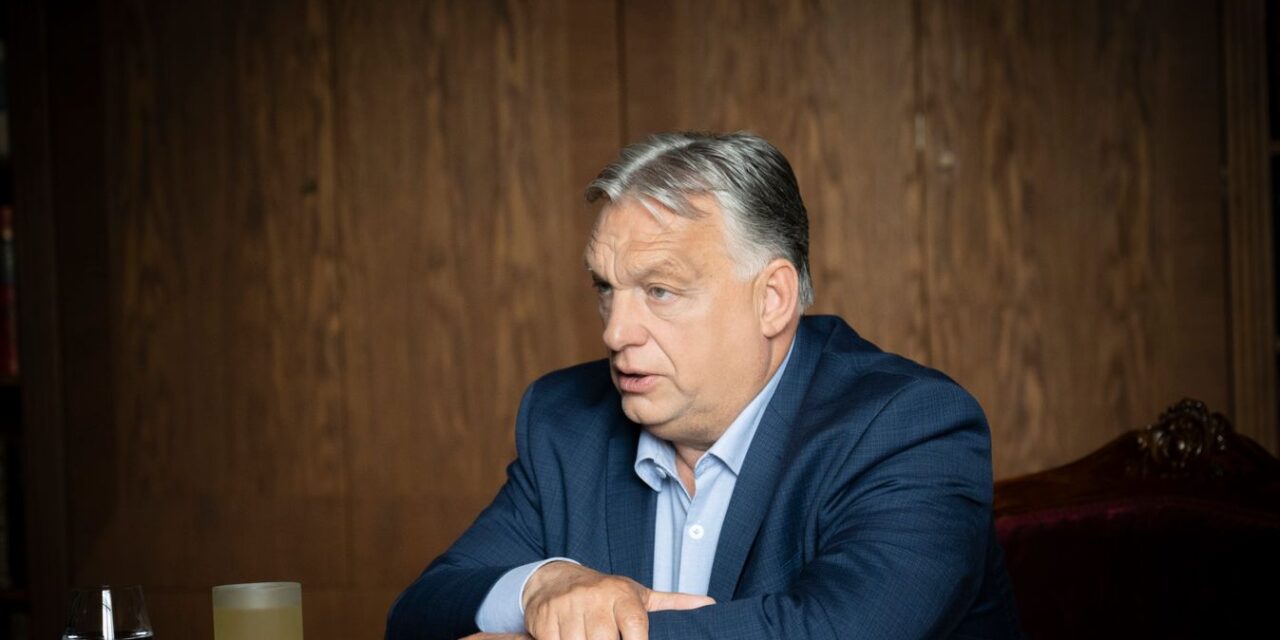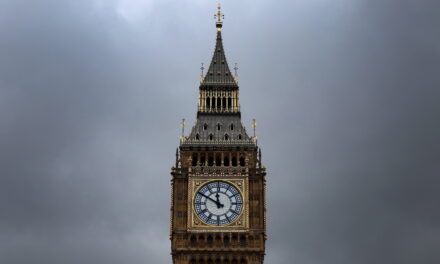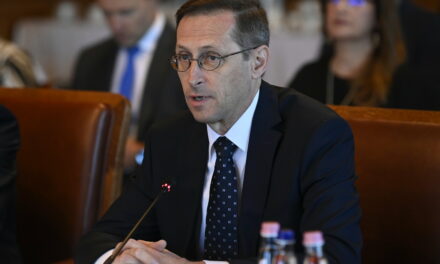Exclusive interview with the Prime Minister.
The most important question is whether there will be a direct war between Russia and Europe. We must elect leaders who are able to prevent Europe from drifting into a war against Russia, Viktor Orbán stated in an interview with our newspaper. According to the Prime Minister, it will become clear in the coming months whether the current Hungarian government will have enough strength to keep our country out of a possible conflict.
Mr. Prime Minister, there will be two elections on Sunday, municipal and European Parliament, but the campaign of the governing parties is only about the war. There are other important topics, why do you treat this so prominently?
Choice is always about two things. The first is to choose good leaders. The only question is who is the good leader. Because a good leader in the sun is not necessarily a good leader in a storm. Therefore, the second thing is to find the right personality. In other words, we need to know why we are looking for a leader, what is in front of us. Since by far the most important question is whether there will be a direct war between Russia and Europe, that is why it is necessary to talk about it now.
We must elect leaders who can prevent Europe from drifting into a war with Russia.
However, this situation, the war raging in our neighborhood, has been going on for two years. Why has this become the main question now?
It is easiest to recall the position of the European powers two years ago and where we are now. Germany previously said they would only send helmets, no weapons. Today, German-made tanks are racing on the territory of Ukraine, and there is talk of handing over anti-aircraft systems. There is already a debate about whether German soldiers should enter Ukrainian territory within the framework of NATO. This is how we got from helmets to direct confrontation.
What is the reason of this?
Europe missed the first step. We are not responsible for this, as we emphasized from the first moment that the Russian-Ukrainian armed conflict must be isolated and the handling of the situation must be discussed. The European leaders, on the other hand, said that the war must be internationalized.
In other words, Europe and America, and now NATO too, must stand behind Ukraine.
Already when this decision was made, it was known that the logic of the war would demand that Europe be more and more involved in the war.
Did you know this two years ago?
The logic of war is different from that of peace. When someone is already in it, has lost people, spent money, and his economy has also adapted, then the logic of war already guides his thinking. Today, both language and logic are distinctly at war throughout Europe. Hungary is the only exception to this.
Can't we be exceptions only in words? Ultimately, we are members of NATO, we have obligations.
This is Hungary's big question. Whether we can keep our actions in line with our intentions and our words. It's always a matter of strength. When István Tisza wanted to stay out of the First World War, he did not have the strength to do so. Miklós Horthy did not have the strength to do this during the Second World War either. The intention was always there, the power was not.
In the coming months, it will be clear whether the current Hungarian government will have enough strength. This is what the European election is about, so I am asking the voters to confirm the anti-war Hungarian government.
What is the connection between an election to the European Parliament and a possible withdrawal from the war? In principle, we only send representatives to Brussels.
The first connection is that, as a result of the internal transformations of the European Union, the role of the European Parliament has continuously increased over the past twenty years. Today, the budget cannot be adopted without the European Parliament. It's not good that it is, but it is. So the European Parliament will have a role in when and how much money, weapons and support European countries provide to Ukraine. The second is that although we send representatives to the European Parliament, all elections are held on a national basis. So this election will strengthen or weaken governments. Even if the election is not about them, this is the nature of democracy.
I hope that pro-war European governments will be weakened by their own voters and give a clear signal that they want change.
According to your opponents, you greatly exaggerate the war. Do you think you are handling the theme in the right way in this campaign?
In the 2022 election campaign, they said it was an exaggeration that Hungary painted a vision of a protracted war and put it at the center of the Hungarian election. Did we exaggerate? No. In the last two years, with each month and week, Europe came closer to war. And this process is not slowing down, it is accelerating. Our assessment of the situation has been consistent since the outbreak of the war and is constantly being verified by time.
NATO, which until now said that it was up to the member states to decide what kind of support they give to Ukraine, now wants to set up a military mission in Ukraine.
In other words, NATO, which stayed away from the war, is already involved in this conflict. So anyone who talks about exaggeration does not follow the events of world politics.
A few days ago, Jens Stoltenberg, the Secretary General of NATO, stated that they did not think that Russia would be able to boost its military industry at such a pace that it now produces three times as much artillery ammunition as the NATO countries combined. What bad luck, the poor people didn't think so! But then what were they thinking? How can such important organizations be led by persons and bodies with such poor competence?
When the European leaders decided against Hungary that they would give all support to Ukraine, I asked the simple question, according to their estimation, how much weapons and money should be given to Ukraine in order to win this war. I didn't get a reply then, and I haven't since. Europe drifted into a war in such a way that the survival of Ukraine now depends on the support of the West, while the Western leaders were not aware of the magnitude of this either in terms of weapons, military technology, or finances. This is hugely irresponsible.
He used the word drift. But who or what is driving Europe?
The drift comes from America. The will that brings us ever closer to war comes from overseas. America is the largest military power in the world and in NATO, if it decides to stand behind one of the warring parties, then today the leaders of Western Europe are not strong enough to say no. Hungary is the only exception to this.
Do you think there is a way back or a stop on this slope for Europe?
All wars are the result of human decisions. We got here because the leaders made bad decisions. I see that good decisions will only be made in America if Donald Trump returns, and in Europe only if the leaders receive a firm pro-peace signal in the current election.
He hinted at how fortunate he would be if Donald Trump returned to the White House. For now, though, he's headed to jail instead.
In a presidential system like the American one, huge swings are possible, and you can even win an election there from prison.
I think that the more they attack Donald Trump, the more it helps him.
Today, more and more people see it as wanting to take away from the American people the right to choose the right president for themselves, and they want to put one of the most likely candidates in an impossible situation even before the election. I think Donald Trump is going to win, no matter what the verdict is.
I guess you don't think it's a coincidence that the Hungarian opposition is supported in dollars.
The Americans have a power projection system throughout the world, including in Hungary, with which they can try to influence the leadership of the given countries in the direction they like. This is a proven system that has already been implemented in many countries. On the one hand, this consists of the support of organizations that claim to be civil, but are actually engaged in political activities, the support of anti-government parties, the support of the media that wants to reduce the authority and support of the government, and the selection of influential people who are placed on their side with financial and professional career opportunities. Some places operate this system successfully, some places do not. Today, most countries in Europe are unable to defend themselves against this American power transmission system.
Hungary is an island in the liberal ocean not only because it is a conservative country, but also because it is here that we alone have built a self-defense system that can stand up to such a large Western, American effort.
Besides, America is our friend, our ally. But it is clearer than day that we are both allies and friends, that he wants to influence us on those issues on which we disagree. Trump's presidency was a bright spot because he didn't do that. Before the war, American power projection was used to influence us in matters of a spiritual nature. Differences of opinion were most evident in the handling of migration and the gender issue. In these two cases, they tried to persuade the Hungarian government to change its position. We said no then, and we say no now, during the war.
Will Fidesz join any representative group in the next European Parliament?
It is a difficult question, because joining any international grouping always involves some adaptation and adjustment. Since we left the European People's Party, which abandoned its previous values, we have been enjoying the benefits of independence. When we represent our opinion and the interests of Hungary, we do not have to coordinate them with anyone else in the European Parliament. That's good, but of course it's not worth much by itself.
If we join a European group, we will have more influence, but we will have to reach agreements on certain issues. This is the dilemma Fidesz is facing, so we are not in a hurry to join.
Can you imagine a situation in which you or the Fidesz MEPs vote for the re-election of Ursula von der Leyen?
No. His support would be an assassination against the most basic ideals of democracy. However, there must always be some connection between performance and choice. Five years ago, the committee headed by the president made clear commitments, none of which he was able to fulfill. In such a case, the driver must go.
Who do you think are your real opponents in the current elections? He said several times that the parties lined up against the government parties are not independent, they are moved from outside.
In this election campaign, it became clear to me that we have no opponents in Hungary. Mostly because those who could be our opponents are not fighting against us, but against each other. In Hungary, there is currently no change of government, but a change of opposition. Of course, the opposition parties run the race by kicking us. In reality, however, they are not competing with the government, they have already been awarded first place, the overwhelming success of the ruling party. They are fighting over who will be the replacement party in a later period. As for the other dimension of the proposal, it is the degree of foreign influence in Hungary. Foreign interest groups, from George Soros through the American Democrats, see every election as a chance to gain positions in the country. We have to defend against this, regardless of the actors in Hungarian domestic politics, who are supported by the Americans, Brussels and George Soros. We have a separate match with them in every election.
This is an election, a campaign that lacks any element of welfare. Is it because the economy is not at its best?
The good shape of the economy is closely related to the war. What I can describe in numbers is that if the world moves towards peace at the end of the year, including the American presidential election, then we will have to spend two percent of the Hungarian budget on military purposes. If it moves towards war, then three to three and a half percent. This means that if we can keep military spending at two percent, Hungarian economic policy will have welfare elements, but not otherwise.
At the end of the campaign, there was an unexpected turn, in Budapest, your candidate for mayor, Alexandra Szentkirályi, withdrew. What do you think about this move?
Alexandra Szentkirályi is right when she said that the most important goal is to open a new chapter in the history of Budapest. If the current situation continues, it will only lead to decline and weakening, and cause the quality of life in the capital to deteriorate. Of course, it would be important for Fidesz to win, but there is something more important than that, and that is for the current city administration to succeed. And since he didn't have the best chance to remove the city administration, but another candidate, that's why he suggested stepping down. We accepted that.
Are you not afraid that the activity of Fidesz voters in Budapest will decrease due to the withdrawal?
Our voters are sensible people. I think that they agree with Alexandra Szentkirályi, the most important thing today is to get rid of the city's current leadership. Any improvement in the situation can only be imagined if this happens.













